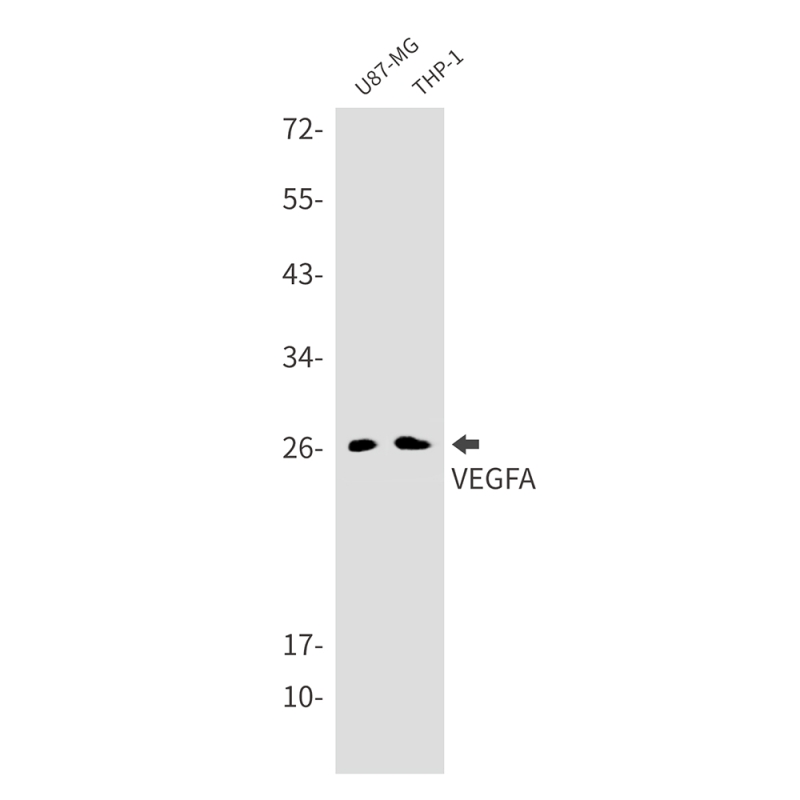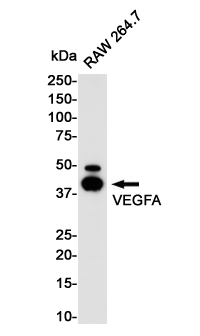

| WB | 1/500-1/1000 | Human,Mouse,Rat |
| IF | 咨询技术 | Human,Mouse,Rat |
| IHC | 咨询技术 | Human,Mouse,Rat |
| ICC | 技术咨询 | Human,Mouse,Rat |
| FCM | 咨询技术 | Human,Mouse,Rat |
| Elisa | 咨询技术 | Human,Mouse,Rat |
| Aliases | VEGFA; VEGF; Vascular endothelial growth factor A; VEGF-A; Vascular permeability factor; VPF |
| Entrez GeneID | 7422 |
| WB Predicted band size | Calculated MW: 27 kDa; Observed MW: 25-50 kDa |
| Host/Isotype | Rabbit IgG |
| Antibody Type | Primary antibody |
| Storage | Store at 4°C short term. Aliquot and store at -20°C long term. Avoid freeze/thaw cycles. |
| Species Reactivity | Human,Mouse,Rat |
| Immunogen | A synthetic peptide of human VEGFA |
| Formulation | Purified antibody in TBS with 0.05% sodium azide,0.05%BSA and 50% glycerol. |
+ +
以下是3-4篇关于VEGFA抗体的参考文献及其摘要概括:
1. **"Bevacizumab plus Irinotecan, Fluorouracil, and Leucovorin for Metastatic Colorectal Cancer"**
*作者:Hurwitz H, Fehrenbacher L, Novotny W, et al.*
**摘要**:该III期临床试验发表于《新英格兰医学杂志》(2004年),首次证明抗VEGFA单抗贝伐珠单抗(Bevacizumab)联合化疗可显著延长转移性结直肠癌患者的生存期,奠定了抗VEGF疗法在肿瘤治疗中的里程碑地位。
2. **"Crystal structure of an angiogenesis inhibitor bound to the VEGF receptor tyrosine kinase domain"**
*作者:Wiesmann C, Fuh G, Christinger HW, et al.*
**摘要**:该研究(《自然》,1997年)通过X射线晶体学解析了VEGF-A与其受体(VEGFR1)结合的结构,揭示了二者相互作用的关键位点,为后续靶向抗体(如贝伐珠单抗)的设计提供了分子基础。
3. **"Ranibizumab for Neovascular Age-Related Macular Degeneration"**
*作者:Rosenfeld PJ, Brown DM, Heier JS, et al.*
**摘要**:这篇发表于《新英格兰医学杂志》(2006年)的临床试验表明,抗VEGFA抗体片段雷珠单抗(Ranibizumab)可显著改善湿性年龄相关性黄斑变性(AMD)患者的视力,成为眼科抗血管生成治疗的标准方案。
4. **"VEGF as a key mediator of angiogenesis in cancer"**
*作者:Carmeliet P.*
**摘要**:该综述(《肿瘤学综述》,2005年)系统总结了VEGF-A在肿瘤血管生成中的核心作用,并讨论了抗VEGF抗体治疗的机制、疗效及耐药性挑战,为靶向治疗研究提供了理论框架。
这些文献涵盖了从基础研究到临床应用的多个层面,反映了抗VEGFA抗体在癌症和眼科疾病中的关键进展。
Vascular endothelial growth factor A (VEGFA) is a pivotal signaling protein involved in angiogenesis and vascular permeability. It binds to receptors VEGFR-1 and VEGFR-2. activating pathways that promote endothelial cell proliferation, migration, and survival. Dysregulated VEGFA expression is linked to pathological conditions, including cancer, age-related macular degeneration (AMD), and diabetic retinopathy.
VEGFA antibodies are therapeutic or research tools designed to neutralize VEGFA activity. Therapeutically, monoclonal antibodies like bevacizumab (Avastin®) and antigen-binding fragments like ranibizumab (Lucentis®) block VEGFA-receptor interactions, inhibiting abnormal blood vessel growth. Bevacizumab, initially approved for cancer, is widely used off-label for ocular diseases. Ranibizumab and fusion proteins like aflibercept (Eylea®) are FDA-approved for AMD and diabetic macular edema due to their high specificity.
In research, anti-VEGFA antibodies are utilized to study angiogenesis mechanisms, tumor microenvironments, and vascular pathologies. They enable detection of VEGFA expression in tissues (via immunohistochemistry) or quantification in biological samples (via ELISA). Challenges include managing resistance in long-term therapies and optimizing delivery routes. Emerging studies explore bispecific antibodies and combination therapies to enhance efficacy. Overall, VEGFA antibodies represent a cornerstone in both clinical management of angiogenesis-driven diseases and experimental vascular biology.
×